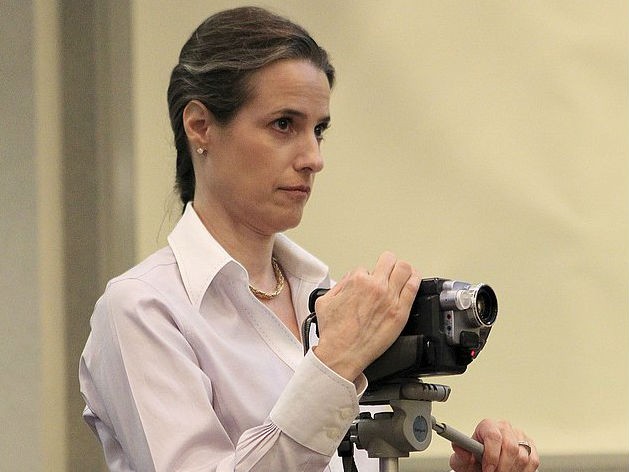ATLANTA (AP) — When Nydia Tisdale turned her camera on a Cumming City Council meeting, the mayor ordered her to stop recording and had a police officer forcibly remove her and the camera.
Two years later, as she filmed a Republican midterm election campaign rally in Dawson County, a sheriff's captain led her away shouting, her arm pinned behind her back, as candidates and spectators looked on.
Armed with a video camera and a thorough knowledge of her legal rights, the 53-year-old self-described citizen journalist has made it her mission to promote transparency in local government.
Tisdale goes to city council meetings, county commission meetings and events where politicians are speaking. She uploads the videos, or "nydeos," to her website. She doesn't interview people or provide commentary, preferring to simply document.
"I feel like citizens are smart enough they can make up their own minds if they're given the information," Tisdale told The Associated Press. "I just try to shed as much light as I can."
But it comes at a cost: She was indicted in November 2015 on charges from the campaign rally episode.
Tisdale, a slight woman with long, dark hair, became interested in the workings of local government while working as a property manager and having frustrating encounters with a county commission nearly a decade ago.
She recalled that a commissioner repeatedly interrupted her during a public comment period. Several people suggested her First Amendment free speech rights may have been violated, so she consulted lawyers. They said the incident didn't merit a lawsuit but gave her a key weapon: a booklet explaining Georgia's open-records and open-meetings laws.
She learned she had the right to film public meetings and began doing just that.
Media experts and government-transparency advocates say people like Tisdale provide a valuable service as cash-strapped newspapers can't always staff public meetings as they used to.
"There's a gap to be filled there," said Rick Edmonds, a media business analyst at The Poynter Institute. But whether a community has someone to provide that coverage, and the quality of such coverage, can vary widely, he said.
Recording and presenting a meeting without commentary, essentially a "hyperlocal C-SPAN," certainly provides a public service, said Jan Schaffer, an expert on innovations in journalism at American University.
"It is a fairly effective way to let people know what their elected officials are doing," she said, but it's more useful when paired with context, reaction and analysis.
Although public recordings of meetings are often static, Tisdale said she reacts to what's going on, filming as people exchange greetings and farewells and catching their reactions.
Tisdale doesn't consider herself a news reporter, but she strives to provide a public record and feels rewarded when her efforts lead to change.
An older woman who handed her a check for $100 was the first to offer financial support.
"She was like, 'You're making a difference. I'm seeing it. You're doing it.' And it just melted me," Tisdale said.
Now, Tisdale accepts donations through her website.
Common Cause Georgia gave her a Democracy Award for citizen advocacy in 2014. The Georgia First Amendment Foundation gave her its Open Government Hero Award in 2015.
She's also gotten used to dirty looks from public officials who don't appreciate being recorded.
Her ejection from an April 2012 Cumming City Council meeting is memorialized in a photo on the back of the business card Tisdale eagerly trades when meeting someone new.
The state's then-attorney general, Sam Olens, sued Mayor H. Ford Gravitt and the city, calling Tisdale's expulsion a violation of open-meetings law. A federal judge agreed and in August 2014 ordered the city and mayor to pay $12,000 in penalties plus attorney fees. Tisdale also sued, and settled the case for $200,000.
Olens informed Tisdale of their victory two days later at the rally in Dawson County — the one that led to her indictment.
Tony Wooten, then a captain with the Dawson County Sheriff's Office, testified in October that the owner of the private venue where the rally was held had asked him to remove Tisdale if she wouldn't stop filming, according to a hearing transcript.
Tisdale testified that Wooten didn't identify himself as law enforcement, and that she didn't stop filming because she believed she had permission.
The owners of Burt's Farm, where the rally happened, testified that Tisdale misrepresented herself as working for the governor when she arrived. Tisdale disputes that.
She was indicted in November 2015 on charges of willful obstruction of a law enforcement officer and criminal trespass.
In May, Tisdale sued Wooten and two other deputies who participated in her arrest. Her lawsuit is on hold pending the outcome of her criminal case.
If convicted on the felony obstruction charge, Tisdale faces one to five years in prison.
Attorney Bruce Harvey is defending her for free — though Tisdale rewards him with homemade blueberry pancakes and trail mix. He took the case, he said, because he found it ridiculous that someone could be arrested for filming public figures at a public event, speaking on matters of public interest.
"I happen to be a First Amendment absolutist, and I think that reporting, journalism and openness in a democratic society really stand at the core of our democratic values," Harvey said. "Without that, society closes down."









